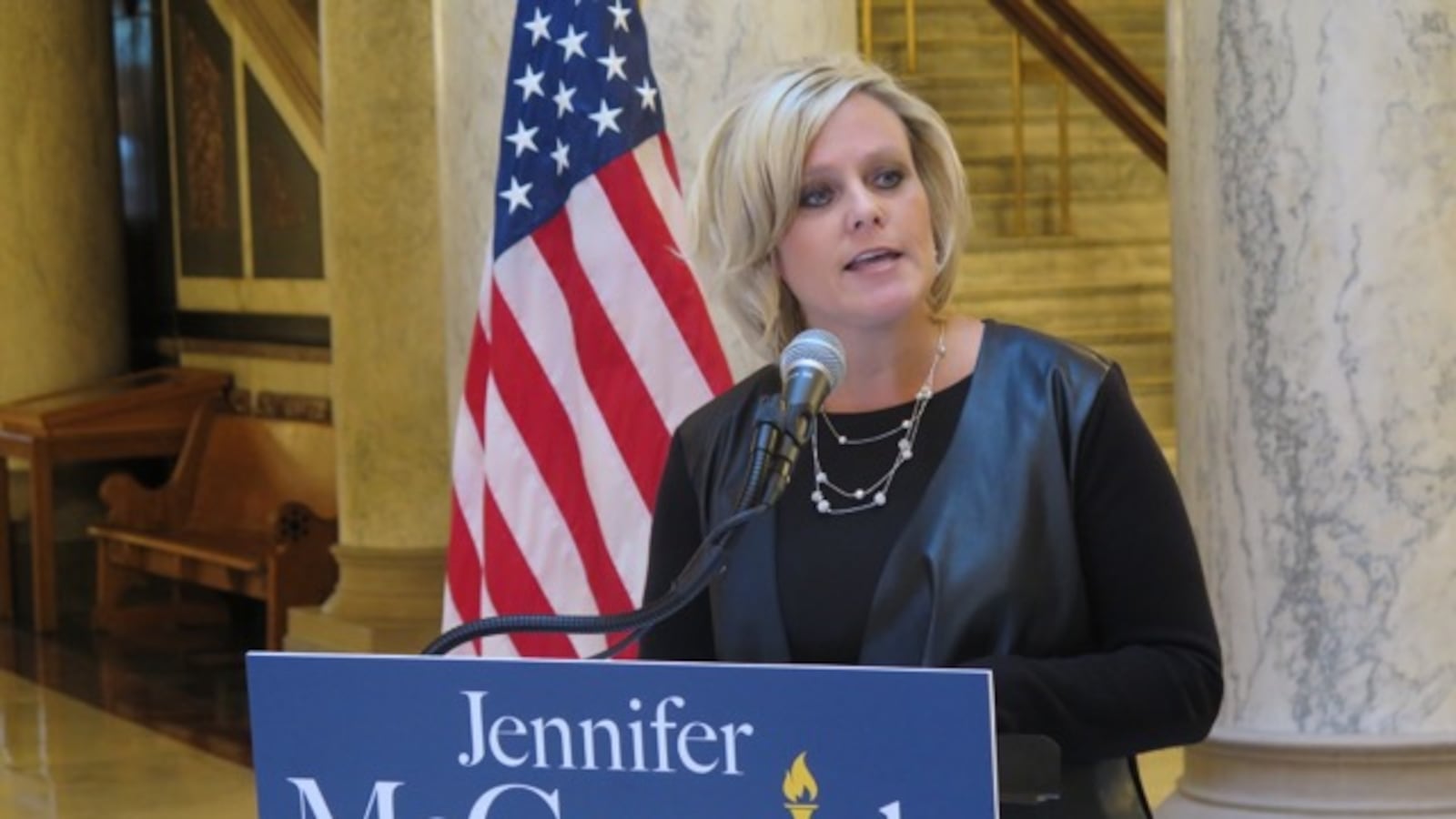Jennifer McCormick’s campaign for state superintendent last year left many voters wondering what side of the education reform debate she was on.
Supporters rallied around the Yorktown Republican for her experiences as a public school teacher, principal and superintendent. And while she raised an impressive sum of money from donors who had previously backed the choice-based reform star Tony Bennett, she maintained she wasn’t Bennett 2.0.
Her critics — often Democrats — weren’t so easily convinced, particularly given those deep-pocketed contributors, which included Hoosiers for Quality Education (the political arm of the school-choice advocacy group Institute for Quality Education) and Christel DeHaan, the founder of the network of Christel House charter schools.
But now, almost a year after she beat Glenda Ritz in an election night upset, some of those Ritz supporters who were skeptical have changed their tune. Maybe she’s not so bad after all, they said.
In her policies and recent comments since taking office, McCormick has just as often clashed with her Republican colleagues and pro-school-choice funders as she has been aligned with them. Yet even during the election, there were few policy areas where McCormick and Ritz had major departures.
That became especially clear at an event hosted by the Indiana Coalition for Public Education last month, where McCormick voiced her support for increased transparency and accountability for charter schools and private schools that accept taxpayer-funded vouchers.
MaryAnn Schlegel Ruegger, an Indianapolis attorney who has been skeptical of choice-based school reform efforts, said while she thought McCormick was qualified for the position, she was initially quite worried about the influence of those who financed her campaign.
“My fear did not come from anything that I specifically knew about her,” Schlegel Ruegger said. “My fear came from which organizations or individuals were providing much of her campaign financing. Unfortunately we’ve learned in Indiana over the last several years that money does seem to be talking very loudly.”
Over time, and after listening to her testify before the Senate Education Committee on testing, Schlegel Ruegger said she was pleased that McCormick seemed to distance herself from the views of her contributors, especially at the recent ICPE event. Schlegel Ruegger is a member of the group.
“I’m eager to see what else she may say” about charter and voucher transparency, Schlegel Ruegger said. “I’m interested to hear her say things like that in front of audiences who aren’t as eager to hear it as the audience Saturday.”
Kristina Frey, a Washington Township parent who leads the Parent Council Network and also an ICPE member, said she thinks she was wrong to jump to conclusions so early. Frey said Washington Township came out strongly for Ritz, as the district where she was an educator, and she appreciated McCormick’s willingness to come out and meet parents in her district, even if they might be skeptical.
“I was wrong in my fears,” Frey said. “I have a lot of respect for Jennifer based on what I’ve seen so far. I think it took real guts to actually stand up in front of the General Assembly and have her say things that are contrary to what the leadership of the party believes.”
Both women said they hope McCormick can take a less passive approach with the legislature this session. Compared to her predecessors, McCormick’s administration was much more quiet during last year’s session, testifying far less on bills and declining to share a legislative agenda.
“I’d love to see her be — I think what schools call it is be much more of a ‘critical friend’ with the legislature,” Schlegel Ruegger said. “She is at a very interesting vantage point — between the views of her funders and her own experiences as a superintendent in public schools. And I would love to see her use that vantage point to critically look at legislation that comes through.”
Frey pointed out, however, that the power of the state’s schools chief is limited. That will be particularly true come 2025, when the governor will make the elected position an appointed member of his cabinet. Lawmakers voted to make the change this past year.
“Just like with Glenda Ritz we learned that the superintendent of public instruction has a limited role in actually setting policy, so though I am very happy with some of her public stances, I still believe that it will be very difficult for her to really do much to impact those things,” Frey said.
It’s unclear whether voters’ perception of McCormick will carry over to the legislature. McCormick opted to mostly promote the few education policies Gov. Eric Holcomb backed this year, but since then, her comments around supporting full-day kindergarten and school choice are largely at odds with what Republican education power players have typically supported.
House Education Committee Chairman Bob Behning, an Indianapolis Republican, was vague about the extent to which that tension has entered into work between the General Assembly and the education department.
“Nobody is going to always agree on everything,” Behning said. “There are differences, but that doesn’t mean that we can’t get along.”
Callie Marksbury, a Lafayette teacher and a former treasurer for the Indiana State Teachers Association, said she hopes there aren’t as many roadblocks thrown up at McCormick as there were for Ritz in terms of impact on state policy. During the election, the state’s teachers unions primarily backed Ritz.
“Please let the legislature leave her alone,” Marksbury said. “Let her do what she said she’s going to do.”
Current law says Indiana would appoint its schools chief in 2025. This story has been corrected to reflect that.

